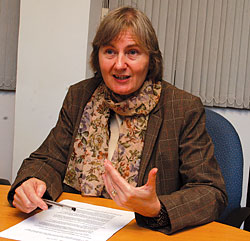 The British aid ministry, DfID, is pumping ?32 million into Nepal this year, making it the kingdom's largest donor. It continues to implement its large-scale development programes in rural areas despite the conflict. Its Asia-Pacific director, Charlotte Seymour-Smith, was in Nepal to study the situation and meet officials and key donor partners. Nepali Times spoke to her on the eve of her departure about how the conflict has affected aid and development trends in the country.
The British aid ministry, DfID, is pumping ?32 million into Nepal this year, making it the kingdom's largest donor. It continues to implement its large-scale development programes in rural areas despite the conflict. Its Asia-Pacific director, Charlotte Seymour-Smith, was in Nepal to study the situation and meet officials and key donor partners. Nepali Times spoke to her on the eve of her departure about how the conflict has affected aid and development trends in the country.
Nepali Times: How do you see the overall situation in the ceasefire period?
Charlotte Seymour-Smith: My overall impression confirms what my team has been telling me, that the most important thing for development in Nepal is the peace process and return to democracy. In a conflict situation, it is indeed very difficult to bring sustainable development to the people of Nepal and to the remote areas. It's difficult for donor agencies to provide support for basic services and to work withthe government to extend the reach and quality of these services.
It's very good that the government has acknowledged the Basic Operating Guidelines (BOGs) and endorsed them. The Maoists should do the same, and both sides should work not just to endorse them at a high or central level but throughout the country so that development agencies and partners can bring development to poor people.
Did you discuss these issues with senior government officials?
We talked mostly about the leadership of the Ministry of Health, the management reforms that are needed in the health sector and the difficulties of delivering health services to people in remote areas.
Is there a possibility for a humanitarian crisis if the conflict drags on?
We would hope that a large-scale humanitarian crisis will not occur... stability is the prerequisite to avoiding a humanitarian crisis. Peace and democracy and normalisation and stability are what we should work towards. We will also look at different instruments and channels where we are able to be most effective. We will work through the government as long as we can and as long as they are effective.
Will the conflict affect DfID aid?
It can do. If I can't report back to my minister and he can't report back to our parliament that the money that we are spending in Nepal is reducing poverty, then we can't justify continuing in the same way. We have to look at other ways. There are also concerns about the safety and security of staff.
Your visit is focussed mostly on health issues. What are your concerns?
There are a lot of issues with health services, capacity gaps, lack of resources compounded by the conflict. It means that very many ordinary people in Nepal will not receive basic health services, which have to be provided by the government. There is really no substitute. This is something of great concern.
How would you evaluate DFID's aid effectiveness in Nepal?
We are looking at the Millennium Development Goals (MDGs). Nepal is at risk of not meeting those MDGs, particularly in the health and education sectors. Therefore it requires action to improve results and effectiveness. That's where we would focus and try and monitor how other's trends are going and what differences we are making.
What is your assessment of the ground situation after the ceasefire?
The levels of violence have definitely declined. The ceasefire is a helpful thing. The international community should definitely work towards a peace process and towards democracy and normalisation.
Is it true that DFID did not increase its aid as planned this year?
It is true for the reasons I have described to you because of the operating difficulties. Under a positive scenario and more normal situation, it becomes possible to disperse high levels of aid more effectively but it's also about effectiveness and the safety of our staff.


